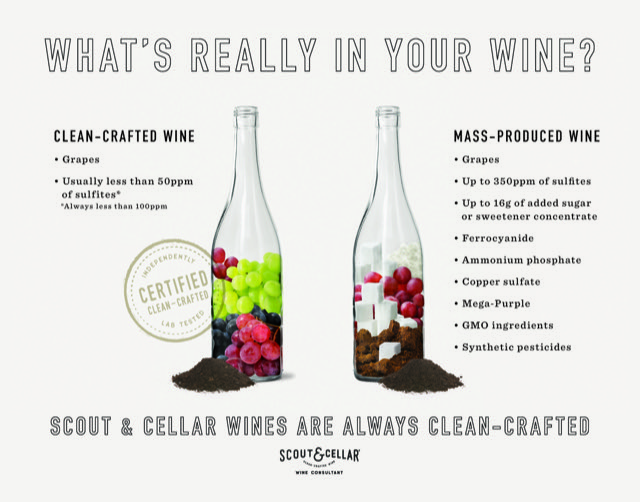
Are you someone who values your health? Do you strive to live a life that is as “clean” as possible? In this day and age, that’s no easy task! Things like reading labels, buying organic fruits and vegetables, purchasing meat from local farmers, using clean beauty products, and buying the safest household cleaners available are just some of the ways that we can protect ourselves and reduce our toxin intake.
But when it comes to clean living, one area that many people don’t think about are the contents of their adult beverages, like wine. Grapes are on the “dirty dozen” list of the most highly sprayed and genetically modified fruits and vegetables, causing people to go out of their way to buy organic grapes. Yet they never think twice about the grapes that go into a bottle of Meomi, Kim Crawford or The Prisoner.
I did a little research on the subject, and what I learned astonished and disgusted me, and changed my wine purchasing habits forever!
So what’s in most large-scale wines?
Most large-scale wines sold in grocery stores or mass retailers are made conventionally, with grapes that have been sprayed with chemicals (and think about how wine is made, with the pressed juice macerating on those toxic skins, for hours or days or weeks). They’re made with added sugar (up to 16 grams/bottle), color (mega-purple which is responsible for the infamous purple lips), acid, commercial yeast (often GMO), and a host of other additives. Actually, there are over 250 commonly-added, FDA approved chemicals and additives! These “regular” wines also contain added sulfites to speed-up fermentation, allowing a process that should take 6+ months to occur in only 48 hours. There have been multiple studies where a range of California wines, ranging from low to high-end were tested, and every single one tested positive for glyphosate – the known carcinogen in Round Up.
Why all the additives?
Wine-making isn’t easy, because when it comes to their growth cycle, grapes can be very tricky. Their natural flavor, color and growing cycle is driven by nature. To capture sameness and establish predictability, producers rely on methods to yield a product that tastes the same, bottle after bottle, year after year. Pesticides, chemical additives and sweetener also make it possible to maximize yields and hide flaws that may exist in those bottles, like bacteria and other unpleasant elements. Mitigating the wine maker’s risk and smoothing revenues is a rational business objective. Unfortunately, this processed wine is completely unnatural, and you can often feel the effects of it with a dry-mouth, sleepless night, or headache. No wonder we feel like garbage the next day!
The most frustrating aspect of all of this is that since wine, beer and spirits are not regulated by the FDA, we have NO IDEA what is in that beautiful bottle, as ingredients are purposely left off the back of the label. And don’t be fooled by price-tag and pretty label. Over 50% of the wine produced in the US is by the same 3 companies, meaning that the same cheaply produced wine can reside in those $50+ bottles being disguised as special or reserve.
So, what do we do? Give up wine? Stop drinking altogether? Let’s not get crazy here!
A better solution, for your body and the planet:
To ensure you’re getting 100% organic grapes with no additives, purchase wines from Scout & Cellar! Scout & Cellar takes the guesswork out of selecting wine by offering a curated wine selection from small family-owned vineyards around that world that meet high standards of winemaking, including organic, biodynamic, and sustainable farming methods. All of their wines contain zero added sulfites, chemicals or sugar, and are independently, third-party tested at UC Davis to verify their purity. Clean-crafted means these wines contain nothing but grapes and low levels of naturally occurring sulfites.

But Scout & Cellar doesn’t stop at clean-crafted wine and clean farming practices. They strive to help the planet in other ways. By reducing the weight of the actual wine bottle, and eliminating that unnecessary foil wrap you find at the top of many wine bottles, they are reducing their carbon footprint in so many ways!
To join the Scout Circle wine club or to purchase Clean-crafted wines a la carte, visit https://scoutandcellar.com/kattransue
Or to learn more about how you can start your own online wine business with Scout & Cellar, connect with me! Our passion is to discover the unknown good and share it along the way. I’d love to share this passion and journey with you.


